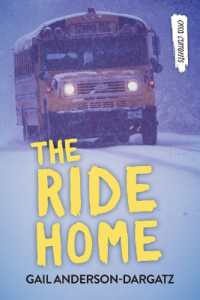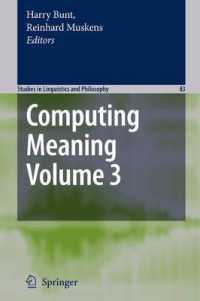- ホーム
- > 洋書
- > 英文書
- > Business / Economics
Full Description
This book concerns any progressive discipline and human profession looking to transform its practice via the cultivation of thinking professionals, which are preferable to unthinking professionals who may be inattentive, unphilosophical, not inclined or not know how to think deeply and profoundly. Thus, they fail to give due consideration to an issue or the consequences before acting. Thinking professionals have a complete and accurate image (mastery) of their professional identity and reality, and they can reflect on, reason through, and justify any decision to act. They would have thinking acumen (i.e., able to make good judgements and shrewd decisions), which requires a rich repertoire of contemporary perspectives and lenses, ideally with a critical bend (exposing and challenging power).
Both The Thinking Professional and transformative practice are used as hooks and threads through the entire book and as anchors for each chapter. The 17-chapter collection is organized into (a) what thinking professionals could think about in the abstract as well as more concrete ideas including (b) how they could think about or view their practice differently and (c) how they could transform their practice and do things differently. Topics include paradigm shifts, the human condition, transdisciplinarity, the holomovement principle, philosophical well-being, perspective transformation, and transformative social change agency.
Readers will also engage with intellectual curiosity and skeptical thinking, tacit knowledge management, the critical science approach, and critical discourse analysis. Other topics include transformative leadership, postmodernism, after postmodernism, reflective human action leadership, and communities of practice. In some cases, the century-old home economics profession is used as a working case to bring ideas alive. This book showcases The Thinking Professional who has transformative practice as their end goal.
Contents
PART I. ARTICLES
Chapter 1. Milton Friedman and Racialized School Choice Ideology, 1945-1960; Jon N. Hale
Chapter 2. The Mounting Challenge to the Subject Curriculum: A Complex Example of the Role of Government in Education Before World War II and Beyond; Benedict Adams
Chapter 3. Looking Back in Wonder: An Oral History of a New School for Immigrant and Refugee Children in Kansas City; Paula D'Introno Watts
Chapter 4. The Emergence of a Curriculum of Assimilation: Educating for Citizenship; Mark Groen
Chapter 5. Derrick Bell's Career and Influence on the Development of Critical Race Theory; Hani Morgan
Chapter 6. The Meaning of Grades from Students' Perspectives: A Historical Exploration; Christopher J. Richmann and Ryan T. Ramsey
PART II. ARTIFICIAL INTELLIGENCE (AI) ESSAYS
Chapter 7. When Why Meets AI: ChatGPT and the Purposes of an Educational History Course; Robert K. Poch, Kinsley Lawrence, and Amran Yusuf
Chapter 8. Charting the Course: The Transformative Journey of AI in Education; Samantha Bradley
Chapter 9. Historical Thinking: An Antidote to the Rhetorical Urgency of AI Discourse; Stephen Jackson and Jennifer Ng
Chapter 10. (Black) Digital Humanities for Educational History: A Technology of Recovery in the Age of Artificial Intelligence and Antiblackness; Amber M. Neal-Stanley
Chapter 11. Teaching the History of Education in an Age of ChatGPT; Andrea Walton
PART III. BOOK REVIEWS
Chapter 12. Emerging Voices: Nurturing the Next Generation of Researchers; Shirley Marie McCarther
Chapter 13. Dedication: A Role Model and Inspiration; Shirley Marie McCarther
Chapter 14. Divisive Social Studies Curriculum: The Exclusion of Americans Gives Students an Incomplete Version of History; Brandy Gearheart
Chapter 15. School Lunch Shaming: Hurting the Hungry; Samantha Eastes
Chapter 16. Disrupting the Work of School Counselors: An Unintended Consequence of Book Bans—When Educators, Communities, and Parents Can't Agree on What Books Are Allowed in Public Schools, School Counseling Suffers; Kim Kile








